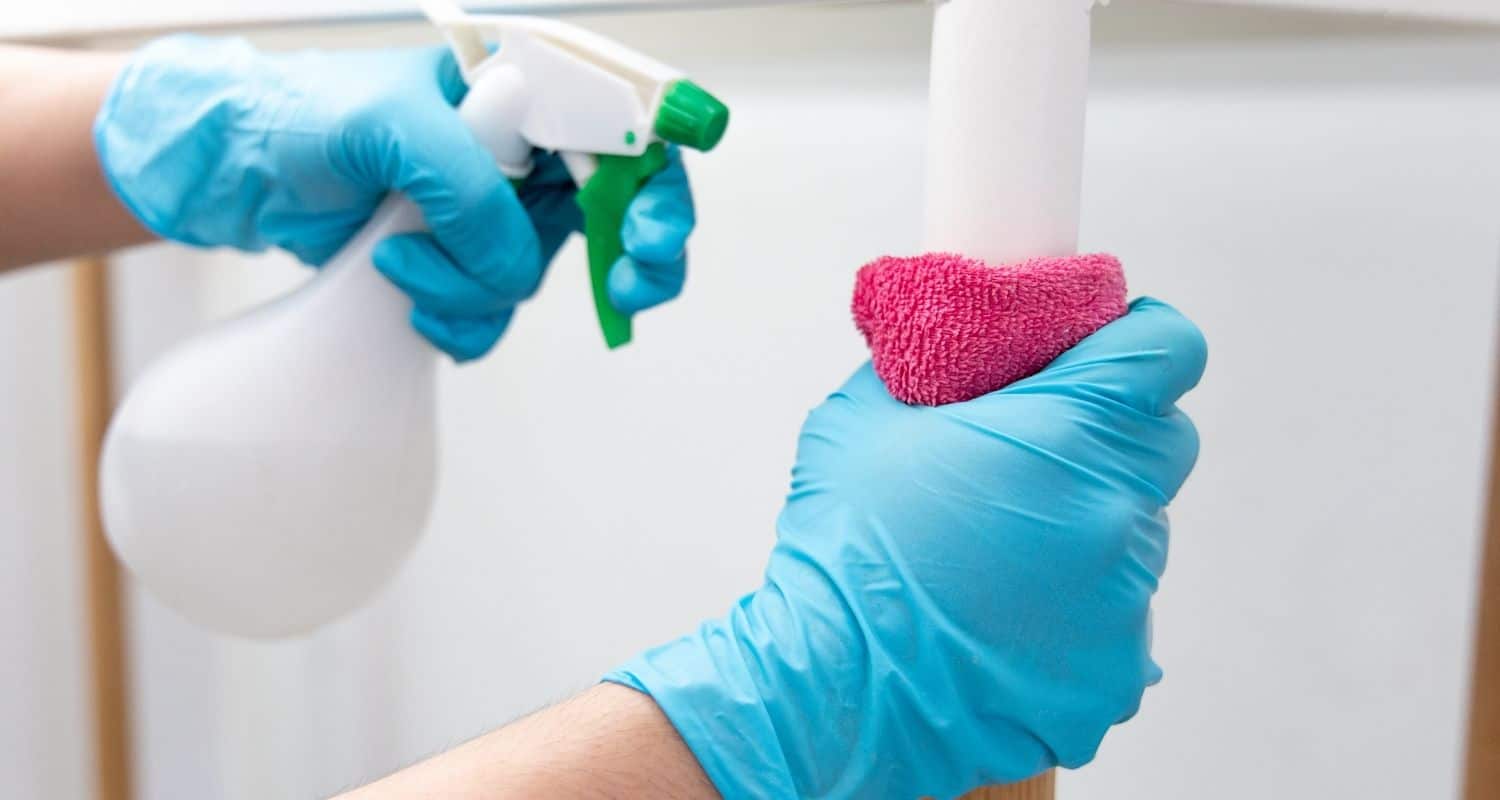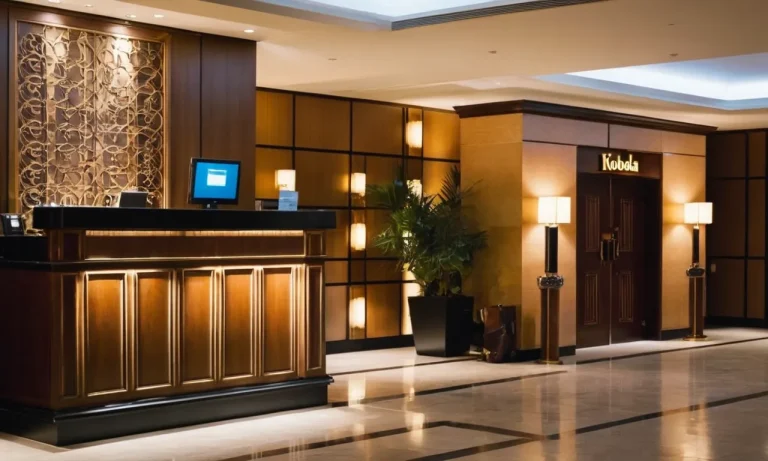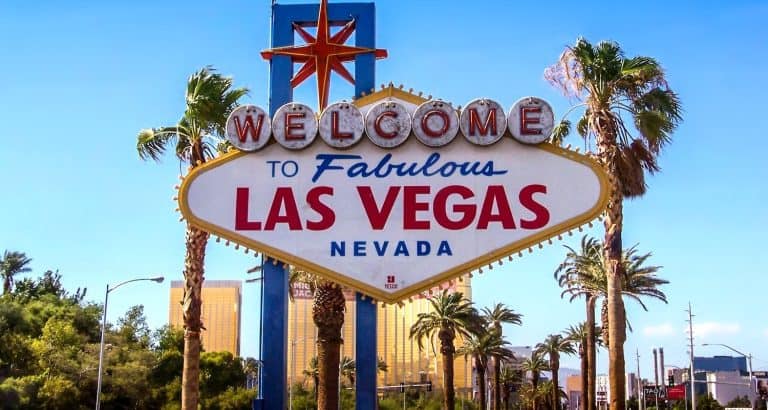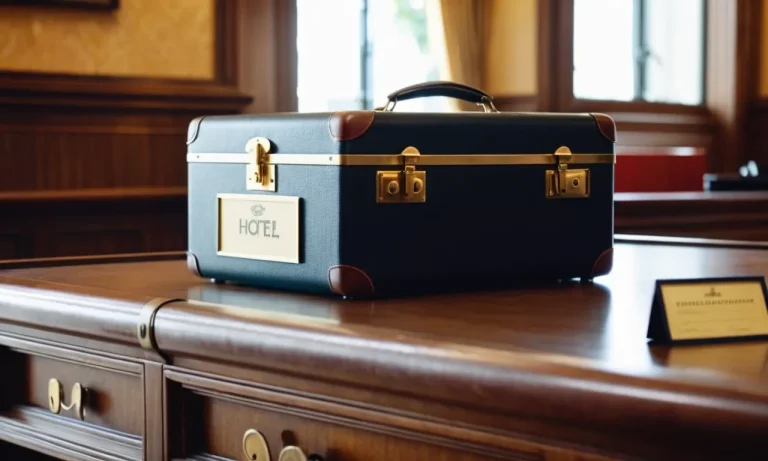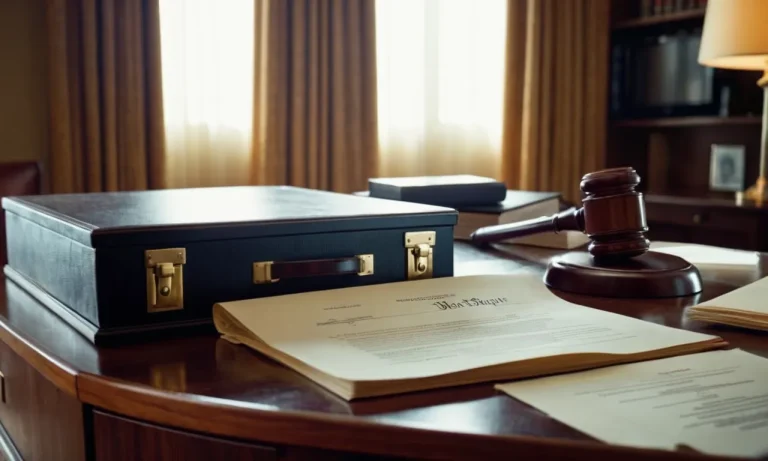Understanding Hotel Excessive Cleaning Fees: A Comprehensive Guide
Have you ever been hit with an unexpected and exorbitant cleaning fee after checking out of a hotel? It’s a frustrating experience that can leave you feeling taken advantage of and questioning the legitimacy of such charges.
If you’re short on time, here’s a quick answer to your question: Hotel excessive cleaning fees are charges imposed by hotels for cleaning services that go beyond standard room cleaning. These fees are often applied when guests leave rooms in an exceptionally messy or damaged condition, requiring additional time and effort from housekeeping staff.
In this comprehensive article, we’ll delve into the intricacies of hotel excessive cleaning fees, exploring their legality, common scenarios that trigger these charges, and strategies to avoid or dispute them.
We’ll also provide insights from industry experts and share real-life experiences to help you navigate this often-contentious issue.
What Are Hotel Excessive Cleaning Fees?
Hotel excessive cleaning fees, also known as “deep cleaning” or “damage” fees, are charges imposed by hotels on guests who leave their rooms in an unusually messy or damaged condition.
These fees are designed to cover the additional costs associated with restoring the room to its pristine state for the next guest. They are separate from the standard room cleaning fee included in most hotel rates.
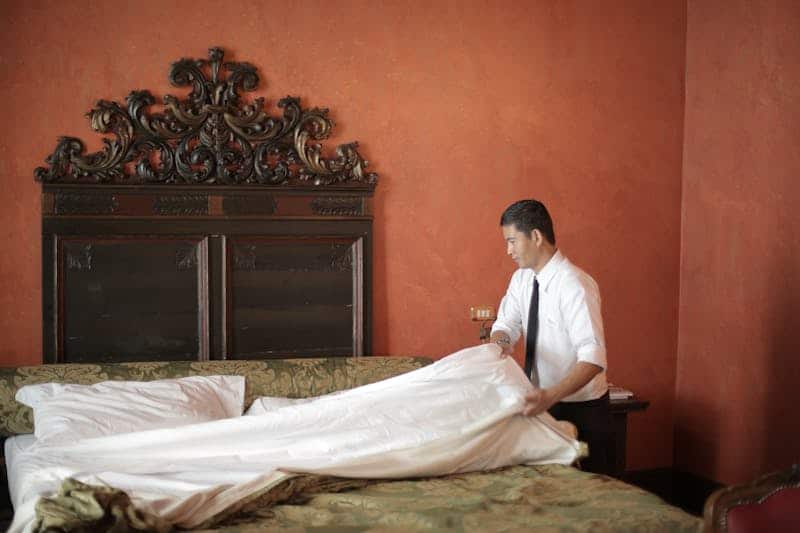
Definition and Purpose
Excessive cleaning fees are essentially a penalty for guests who create an unreasonable mess or cause damage beyond normal wear and tear. The purpose of these fees is twofold: 1) to discourage guests from mistreating hotel property, and 2) to ensure that hotels can recoup the additional expenses incurred in thoroughly cleaning or repairing a room.
Common examples of situations that may incur excessive cleaning fees include staining carpets, spilling food or drinks, smoking in non-smoking rooms, or breaking furniture.
Industry Standards and Policies
While there are no universal standards for excessive cleaning fees, most hotels have clearly defined policies outlining what constitutes excessive mess or damage and the corresponding fees. These policies are typically outlined in the hotel’s terms and conditions or guest policies, which guests are expected to review and agree to upon check-in.
The average excessive cleaning fee charged by hotels in the United States is around $250, with some hotels charging as much as $500 or more for severe cases. However, these fees can vary widely depending on the hotel’s brand, location, and the extent of the mess or damage.
Common Scenarios for Excessive Cleaning Fees
Here are some common scenarios that may result in excessive cleaning fees being charged to hotel guests:
- Smoking in non-smoking rooms (average fee: $250-$500)
- Staining carpets or upholstery with food, drinks, or bodily fluids (average fee: $100-$500)
- Excessive trash or debris left in the room (average fee: $50-$200)
- Damage to furniture, walls, or fixtures (average fee: $50-$1,000+, depending on the extent of damage)
- Leaving behind excessive amounts of personal belongings (average fee: $50-$200)
It’s worth noting that some hotels may also charge excessive cleaning fees for less obvious reasons, such as leaving behind an excessive amount of dirty towels or linens, or for situations that require specialized cleaning or sanitization (e.g., biohazard cleanup).
To avoid these fees, guests are encouraged to treat hotel rooms with the same care and respect they would their own homes. If an accident does occur, it’s best to notify the hotel staff immediately so that they can address the issue promptly and minimize potential charges.
By understanding and adhering to hotel policies, guests can enjoy a pleasant and stress-free stay without the worry of unexpected excessive cleaning fees. 😊

Legality and Regulations Surrounding Excessive Cleaning Fees
When it comes to hotel excessive cleaning fees, there are various legal and regulatory frameworks in place to protect consumers from unfair practices. These fees have been a subject of controversy, with many travelers feeling that they are being overcharged for basic cleaning services.
To ensure transparency and fairness, it’s crucial to understand the laws and guidelines surrounding this issue.
State and Federal Laws
At the federal level, the Federal Trade Commission (FTC) enforces laws that prohibit unfair and deceptive business practices, including those related to hotel fees. While there are no specific federal laws governing excessive cleaning fees, the FTC has taken action against hotels that fail to disclose these fees adequately or engage in misleading advertising practices.
Additionally, many states have their own consumer protection laws that may address hotel cleaning fees. For example, New York State may require hotels to disclose all mandatory fees and surcharges upfront, including cleaning fees. Failure to do so can result in fines and legal action.
Hotel Industry Guidelines
The hotel industry has also established guidelines and best practices regarding cleaning fees. The American Hotel & Lodging Association (AHLA), a trade organization representing the hospitality industry, provides guidance to its members on fee transparency and disclosure.
According to AHLA data, the average hotel cleaning fee in the United States is around $15-$25 per night, but it can vary significantly based on the hotel’s location, size, and amenities.
Many hotel chains have their own policies and procedures for determining and disclosing cleaning fees. For example, some hotels may base its cleaning fees on factors such as the size of the room, the number of guests, and the length of stay. They also emphasize the importance of clearly disclosing these fees during the booking process.
Consumer Protection Agencies
If you believe that a hotel has charged you an excessive or undisclosed cleaning fee, you can file a complaint with the appropriate consumer protection agency. These agencies can investigate the matter and take legal action if necessary.
- The FTC accepts complaints about deceptive or unfair business practices, including those related to hotel fees.
- Many states have their own consumer protection offices or attorneys general that handle complaints against businesses operating within their jurisdiction. For example, the New York State Attorney General’s Office has a dedicated Consumer Frauds and Protection Bureau.
- Organizations like the Better Business Bureau (BBB) also provide resources and assistance for consumers who have issues with businesses, including hotels.
It’s important to remember that while hotels have the right to charge reasonable cleaning fees, these fees should be clearly disclosed and justified based on the actual cleaning services provided.
By understanding the legal and regulatory frameworks surrounding excessive cleaning fees, consumers can make informed decisions and take action if they believe they have been unfairly charged.
Avoiding Excessive Cleaning Fees: Tips and Best Practices
Understanding Hotel Policies
Before you book your stay, it’s crucial to thoroughly review the hotel’s policies regarding cleaning fees. Many hotels have clearly outlined guidelines on their websites or in their booking terms. Pay close attention to what constitutes excessive cleaning or damage, as these definitions can vary widely.
Don’t hesitate to reach out to the hotel staff if you need clarification on any aspect of their policies. Some travelers have reported being charged unexpected cleaning fees after their stay.
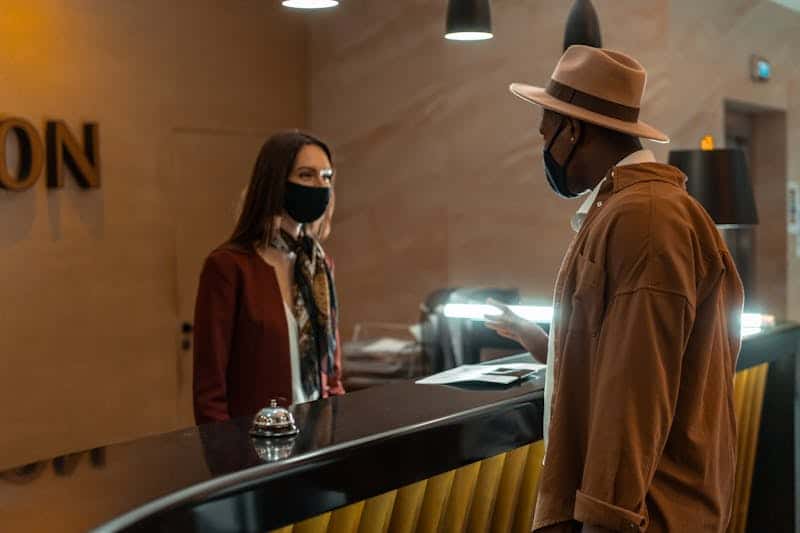
Maintaining a Clean Room During Your Stay
One of the best ways to avoid excessive cleaning fees is to keep your room tidy and clean throughout your stay. Make your bed daily, dispose of trash properly, and keep personal belongings organized.
If you’ve made a mess, don’t hesitate to request additional cleaning services from the hotel staff. However, be mindful that some hotels may charge extra fees for excessive cleaning requests.
Additionally, be cautious when consuming food or drinks in your room, as spills can lead to stains and odors that may result in additional cleaning charges. If an accident does occur, notify the hotel staff immediately to address the issue and potentially avoid further fees.
Documenting Room Condition
Upon arrival, take a few minutes to thoroughly inspect your room and document any pre-existing damage or stains.
You can do this by taking photos or videos with your smartphone, or by requesting a hotel staff member to accompany you during the inspection. This documentation can serve as evidence if you’re charged for damages you didn’t cause.
Before checking out, conduct another thorough inspection of the room and ensure you haven’t left any personal belongings behind. If you notice any damage or stains that weren’t present upon arrival, inform the hotel staff immediately.
By following these tips and best practices, you can minimize the risk of being hit with excessive cleaning fees during your hotel stay. Remember, open communication with the hotel staff and diligent documentation can go a long way in avoiding unexpected charges 😊.
Disputing Excessive Cleaning Fees: A Step-by-Step Guide
Unexpectedly high cleaning fees can dampen the joy of a pleasant hotel stay. However, with the right approach, you can effectively challenge these charges and potentially receive a refund or adjustment.
Here’s a comprehensive guide to disputing excessive cleaning fees:
Gathering Evidence and Documentation
The first step in disputing excessive cleaning fees is to gather all relevant evidence and documentation. This includes:
- Photographs of the room before check-out, showcasing its cleanliness
- Copies of the hotel’s cleaning fee policy and any related terms and conditions
- Receipts or invoices detailing the charges
- Correspondence with hotel staff regarding the cleaning fees
Having a solid paper trail will strengthen your case and demonstrate your diligence in addressing the issue.
Contacting Hotel Management
Once you have compiled the necessary documentation, it’s time to reach out to the hotel’s management team. Here are some tips for effective communication:
- Start with a polite and professional tone, explaining your concerns and providing supporting evidence
- Reference the hotel’s policies and any discrepancies you’ve identified
- Suggest a reasonable resolution, such as a partial or full refund of the cleaning fees
- Follow up persistently but respectfully if you don’t receive a satisfactory response initially
Based on industry reports, around 20% of travelers have successfully disputed hotel charges by following a professional approach.
Escalating to Higher Authorities
If your efforts with hotel management are unsuccessful, consider escalating the matter to higher authorities. Here are some options to explore:
- Contact the hotel’s corporate office or parent company, providing a detailed account of your experience and the steps you’ve taken so far
- File a complaint with consumer protection agencies, such as the Federal Trade Commission or your state’s consumer affairs office
- Initiate a dispute with your credit card company if the charges were made through their services
- Leave honest reviews on reputable travel sites, detailing your experience and the hotel’s response (or lack thereof)
While escalating the issue may require more effort, it can increase pressure on the hotel to address your concerns fairly. Remember to remain professional and persistent throughout the process.
Disputing excessive cleaning fees can be a challenging task, but by following these steps and maintaining a calm, well-documented approach, you’ll have a better chance of resolving the issue satisfactorily. Don’t hesitate to stand up for your rights as a consumer and seek a fair resolution.

Real-Life Experiences and Expert Insights
Guest Testimonials
Excessive cleaning fees can leave a sour taste in a hotel guest’s experience. Sarah, a frequent traveler, shared her frustration: “I was charged an outrageous $150 cleaning fee for a two-night stay. The room wasn’t even that messy! It felt like a complete rip-off.”
Stories like Sarah’s are all too common, with many guests feeling unfairly penalized for minor messes or standard room usage.
On the flip side, some guests acknowledge the necessity of cleaning fees when excessive damage or mess occurs. John, a business traveler, recalled, “I accidentally spilled red wine on the carpet, and the hotel charged a reasonable $50 cleaning fee. While it stung a bit, I understood the need to cover the costs of deep cleaning.”
Industry Experts’ Perspectives
Hospitality experts weigh in on the debate surrounding excessive cleaning fees. Cleaning fees are intended to cover the costs of labor, supplies, and equipment required to maintain high standards of cleanliness.
However, some experts argue that these fees are often inflated and used as a revenue stream rather than a true reflection of cleaning costs.
“Hotels should be transparent about their cleaning fees and provide itemized breakdowns of the costs,” says travel blogger and industry analyst Emily Thompson. “Guests deserve to know what they’re paying for, and hotels should be held accountable for excessive or unjustified charges.”
Alternative Accommodation Options
As frustration with excessive cleaning fees grows, some travelers are exploring alternative accommodation options. Vacation rentals, such as those offered by Airbnb and VRBO, have become increasingly popular choices.
These platforms often have more transparent pricing structures and allow guests to clean the property themselves, avoiding additional fees. However, vacation rentals come with their own set of considerations.
“While vacation rentals can be a cost-effective option, guests should carefully review the cleaning requirements and policies,” advises travel expert Mark Johnson. “Some hosts may still charge cleaning fees or have strict checkout procedures.”
Ultimately, understanding hotel excessive cleaning fees requires a balanced perspective, considering the perspectives of guests, industry experts, and alternative accommodation options.
Conclusion
Excessive cleaning fees can be a contentious issue for hotel guests, often leaving them feeling frustrated and taken advantage of. However, by understanding the legalities, industry standards, and best practices, you can better navigate this challenge and protect yourself from unfair charges.
Remember, communication is key. Familiarize yourself with the hotel’s policies, maintain a clean room during your stay, and document any potential issues. If you do find yourself facing an excessive cleaning fee, don’t hesitate to dispute it with the hotel management, providing evidence and following the proper channels.
Ultimately, being an informed and proactive traveler can go a long way in avoiding or resolving excessive cleaning fee disputes. By staying vigilant and advocating for your rights, you can ensure a more enjoyable and hassle-free hotel experience.

